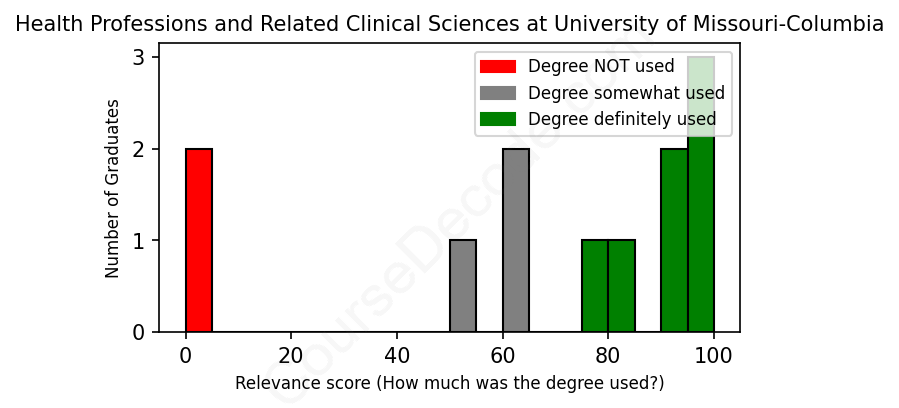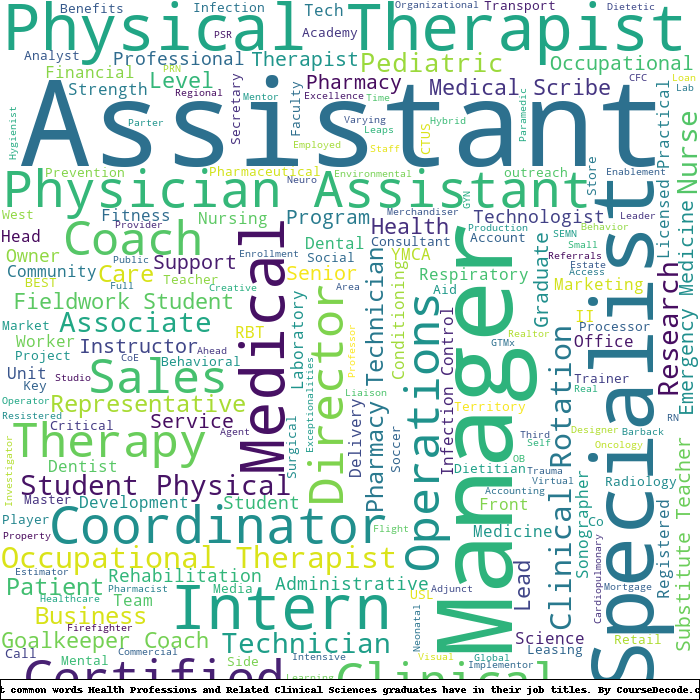
First, some facts. Of the Health Professions and Related Clinical Sciences graduates from University of Missouri-Columbia we've analyzed , here's how many have used (or NOT used) their degree in their career:

These are estimates based on AI analysis of 12 LinkedIn profiles (see below).
The verdict? On par with the average. Overall, with an average relevance score of 67%, Health Professions and Related Clinical Sciences graduates from University of Missouri-Columbia have about the same likelihood of finding work in this field as the average graduate across all fields:
And for comparison, here's the chart for all profiles we've looked at across all degrees.
Also, after graduating, 41% of these graduates have pursued further education other than another Bachelor's degree (such as a Masters degree or other), compared to the average across all profiles of 35%. This suggests you may need more than just a Bachelors degree to be competitive as a Health Professions and Related Clinical Sciences graduate.
See the details:
|
Relevance score: 0% We think this person has NOT gone into a career related to their degree. We think this person has NOT gone into a career related to their degree.
DEGREE INFOGraduated in 2020 from University of Missouri-Columbia with a Bachelor of Health Sciences in Health Sciences in Health Professions and Related Clinical Sciences. No other secondary education since. JOB HISTORY SINCE GRADUATIONSalesperson Arena Liquor Mar 2020 - Aug 2020 ABOUTNo information provided. |
The top 10 most common jobs done by the graduates we've analyzed (ranked most common to least) are:
From analyzing the LinkedIn profiles of graduates from the University of Missouri-Columbia who studied Health Professions and Related Clinical Sciences, a clear pattern emerges in their career paths. The most common jobs held by these individuals include roles such as Pharmacy Technicians, Clinical Pharmacy Interns, Patient Transition Specialists, and various positions directly tied to healthcare settings. These roles generally require a solid understanding of pharmacy practices and patient care, aligning well with the skills learned during their degree. Many of these positions, like the OB/GYN Sonographer and Behavioral Health Specialist, make extensive use of the clinical knowledge and training acquired through their education, making them highly relevant to the health professions field.
However, it's important to note that not all jobs held by these graduates are directly related to their field of study. For example, positions like Mortgage Loan Processor or Salesperson do not require any specific knowledge from their degree, highlighting a segment of graduates who may have strayed from traditional health-related roles. While a significant number found positions that leverage their education, others pursued careers that seem more administrative or unrelated to health sciences. Overall, while many graduates are working in relevant healthcare roles, there is still a noticeable diverse range of career choices that reflect varying interests and opportunities post-graduation.
Here is a visual representation of the most common words in job titles for Health Professions and Related Clinical Sciences graduates (this is across all Health Professions and Related Clinical Sciences graduates we've analyzed, not just those who went to University of Missouri-Columbia):

When you look at the career paths of graduates from the Health Professions and Related Clinical Sciences program at the University of Missouri-Columbia, there’s a mixed bag of outcomes. Many students start off in roles like pharmacy technicians, interns, or healthcare specialists soon after graduation, which makes sense given their educational background. For instance, several graduates landed positions in hospitals and clinics right after finishing school, indicating they’re often stepping right into relevant health-related jobs. However, there are also a few examples of graduates taking unexpected detours, like those who ended up in marketing or loan processing shortly after their degrees.
Fast forward five to ten years, and you still see a blend of trajectories. On one hand, some alumni have advanced within the healthcare system, moving from entry-level technician or intern roles to more specialized positions, like pediatric mental health specialists or pharmacy residents. On the other hand, there are a handful of graduates who didn’t stick to the health professions and found themselves in totally different industries, like sales or human resources. Overall, while many graduates appear to be carving out solid careers within the health sector, there’s definitely a segment that seems to drift away from the industry, highlighting inconsistencies in post-college paths.
Getting a Bachelor’s degree in Health Professions and Related Clinical Sciences at the University of Missouri-Columbia can be pretty challenging, but it really depends on your interests and strengths in science and health-related topics. Generally, these programs include some tough coursework, like biology, anatomy, and statistics, which can be a bit of a workout for your brain if you’re not super into those subjects. However, if you’re passionate about health sciences and stay organized with your studies, it can be manageable. Most students find it to be about average in difficulty compared to other degrees, so it's definitely doable as long as you're willing to put in the effort!
Most commonly, in the LinkedIn profiles we've looked at, it takes people 4 years to finish a Bachelor degree in Health Professions and Related Clinical Sciences.
Looking at the career paths of these graduates from the University of Missouri-Columbia, it seems like they’ve landed a mix of decent jobs, but the money might vary quite a bit. For example, those who went into pharmacy or specialized healthcare roles, like sonographers, are probably making a solid salary since those fields usually pay well. On the flip side, some of the jobs, like fitness trainers or sales positions, might not bring in as much cash, especially early on. Overall, it seems like many of these grads are on the right track and have opportunities for growth, but not every job listed is going to make them rolling in dough right away. They’ve got good potential, but it really depends on the job and how they grow in their careers!
Here is a visual representation of the most common words seen in the "about" section of LinkedIn profiles who have a Bachelor degree in Health Professions and Related Clinical Sciences (this is across all Health Professions and Related Clinical Sciences graduates we've analyzed, not just those who went to University of Missouri-Columbia). This may or may not be useful:

Here are all colleges offering a Bachelor degree in Health Professions and Related Clinical Sciences (ordered by the average relevance score of their Health Professions and Related Clinical Sciences graduates, best to worst) where we have analyzed at least 10 of their graduates:
| College | Score | Count |
|---|---|---|
 University of Missouri-Columbia University of Missouri-Columbia
|
67 | 12 |
 University of Central Florida University of Central Florida
|
59 | 17 |